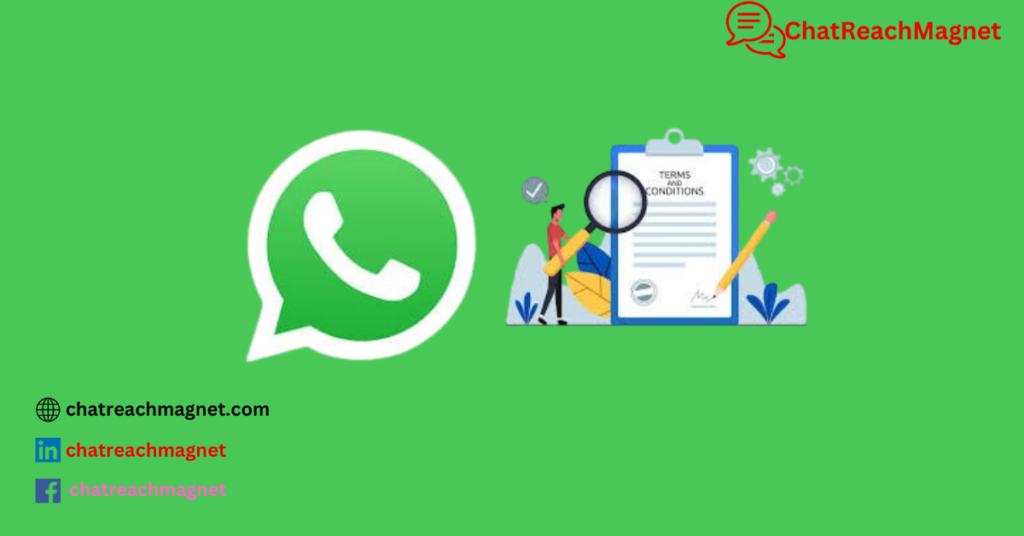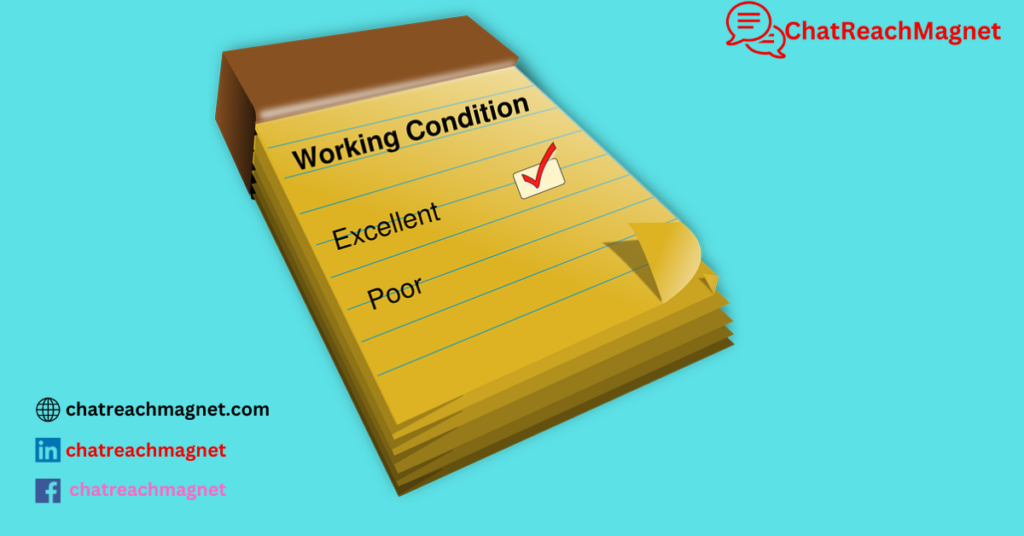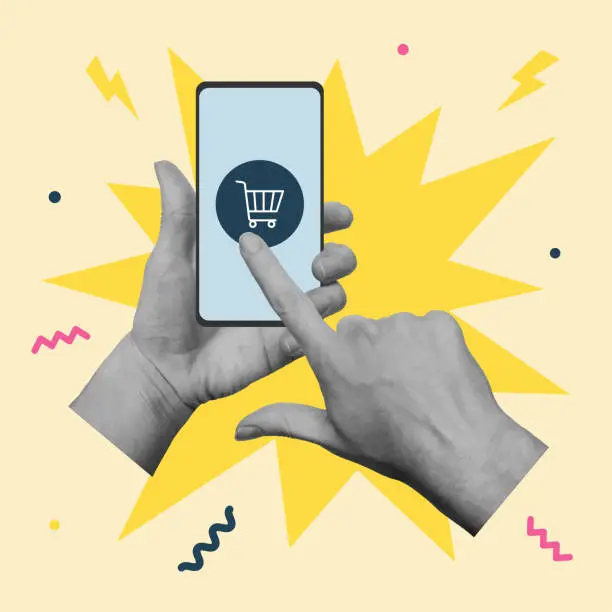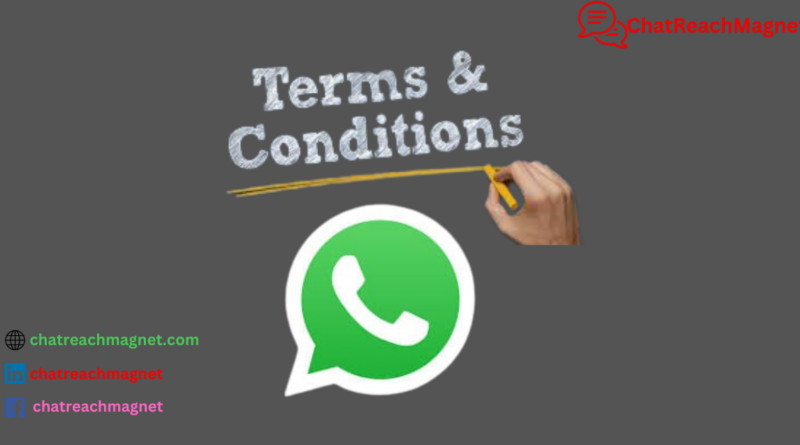WhatsApp Terms and Conditions Every Marketer Must Know
WhatsApp have taken Digital Marketing to a next level and have rised to be one of the most dynamic online tool for engaging with customers.
With it populate users worldwide, it serves as an increedible podium for businesses to communicate directly with their audience, forster relationships, and engagement.
However, as with any communication platform, WhatsApp has its own set of terms and conditions that marketers must navigate carefully. Having a knowledge of these terms is important to avoid any violations, ensure compliance, and make the most out of the platform’s potential for business.
This lines below explores the key WhatsApp terms and conditions that every marketer must be aware of before they launch any campaign or strategy on the platform.
From WhatsApp’s business policies to specific rules about using data and messaging customers, we will cover all the crucial points you need to stay compliant while reaping the full benefits of this messaging giant.
Why it is Important to know the Whatsapp Terms and Condition as a Marketer

Having a grip and adhering to WhatsApp’s terms and conditions is not just about avoiding penalties, it’s about creating a respectful, compliant, and effective marketing strategy that builds trust and delivers value to consumers.
1. Compliance with Platform Rules
For any marketer, having a grasp of the WhatsApp’s terms and conditions is fundamental to ensuring that their campaigns operate within the platform’s rules.
WhatsApp enforces strict policies regarding the nature and content of messages, the frequency of communication, and how businesses must obtain consent from users before engaging with them.
Going against these rules can result in consequences ranging from temporary suspension to a permanent ban from the platform. This is especially important for businesses that rely on WhatsApp for customer engagement, as losing access can severely disrupt operations and diminish trust with their audience.
Staying compliant ensures that your marketing strategies remain sustainable and effective on the platform.
2. Customer Data Privacy
As data privacy is continuously been a thing of concern, understanding WhatsApp’s terms and conditionts concerning the protection of customer information is essential for marketers. WhatsApp, especially under regulations like the General Data Protection Regulation (GDPR), mandates that businesses handle user data responsibly.
This means obtaining explicit consent before collecting or using any personal information, such as phone numbers, and being transparent about how that data will be used.
Mishandling customer data or failing to follow privacy regulations can result in serious legal consequences, such as fines, and can cause significant reputational damage to a business.
Knowing the terms helps marketers create transparent, secure, and responsible data practices that build trust with their audience.
3. Avoiding Spam and Unwanted Messaging
One of WhatsApp’s most critical terms is its anti-spam policy, which is designed to protect users from receiving unsolicited bulk messages. For marketers, this means that all communications must be relevant and consent-based, not randomly broadcast to potential leads.
Sending unwanted promotional content, or overloading users with constant messages, can lead to your account being flagged for spam, which could result in restrictions or a ban.
More importantly, spamming users damages the business’s reputation, as customers are less likely to trust a company that invades their privacy or overwhelms them with unsolicited content. By understanding and respecting WhatsApp’s anti-spam policies, marketers can create a positive user experience that fosters customer loyalty.
4. Building Trust with Consumers
One of the cornerstones of successful marketing on WhatsApp is building and maintaining trust with your consumers. WhatsApp’s terms and conditions place a significant emphasis on consent, privacy, and user control.
Adhering to these principles, businesses show that they respect their customers’ preferences and data. This transparency and respect are essential in building long-term relationships with customers. When users feel that a business values their privacy and isn’t exploiting the platform for aggressive marketing, they are more likely to engage positively.
Ultimately, following WhatsApp’s terms helps businesses create a respectful, user-friendly communication strategy that enhances customer trust and loyalty.
5. Proper Use of Automation
Automation, when used responsibly, can enhance a business’s customer service efforts by providing quick responses and handling frequent inquiries. However, WhatsApp has strict guidelines on the use of automation tools, especially when it comes to chatbots and automated messaging.
While automation can streamline processes, it is essential that marketers maintain a human touch and avoid over-reliance on bots. WhatsApp encourages businesses to strike a balance between automation and personal engagement.
Using automation improperly, such as sending automated promotional content without user consent or flooding users with repetitive messages, can result in penalties. Understanding WhatsApp’s terms on automation, marketers can enhance customer experience without compromising compliance.
6. Staying Updated on Policy Changes
WhatsApp’s terms and conditions are not static; they evolve in response to changes in legal requirements, market trends, and user expectations. As a marketer, it is critical to stay informed about any updates to these policies.
Failing to do so can result in unintended violations, which could harm your business. Policy changes might affect how data can be used, what types of messages can be sent, or how businesses should manage customer consent.
Keeping up-to-date with WhatsApp’s latest terms and conditions helps marketers adapt their strategies accordingly, ensuring continued compliance and avoiding any potential penalties that might arise from outdated practices.
WhatsApp Terms and Conditions Every Marketer Must Know

1. WhatsApp’s Basic Terms of Service
At the core of WhatsApp’s terms are its basic terms of service. These apply to all users, both personal and business, and cover the general rules about how the app can be used. For marketers, some of the most important aspects include:
Age Requirement: WhatsApp is designed for users over the age of 13 and 16 in most countries, though some regions may have higher age restrictions. It is important to ensure your marketing content adheres to this rule by targeting only the appropriate audiences.
Respecting Local Laws: WhatsApp mandates that users must comply with the laws of their respective countries. This means your marketing practices need to align with regional privacy laws, consumer rights, and advertising standards.
No Illegal Content: You cannot use WhatsApp to promote any illegal activities, including selling prohibited products, encouraging fraud, or promoting misinformation.
Understanding and following these basic terms is the first step to avoiding any risk of having your account flagged or banned. If WhatsApp determines that you are in violation of these policies, you risk losing access to the platform altogether, which could be detrimental to your marketing strategy.
2. WhatsApp Business Policy
WhatsApp has a dedicated platform for businesses called WhatsApp Business, and this comes with its own set of terms and policies. These are crucial for marketers as they specifically target how businesses should use the platform.
Business API Usage: WhatsApp Business API is meant for medium and large businesses looking to interact with customers at scale. However, using this API requires approval from WhatsApp, and you must ensure that your usage aligns with their policies, particularly when it comes to data sharing and customer messaging.
Customer Consent: One of the most important rules for marketers is obtaining customer consent before sending messages. Customers must first opt-in to receive communications, either through a form on your website, via a social media campaign, or by some other explicit action. WhatsApp prohibits businesses from sending unsolicited messages.
Message Types: WhatsApp allows businesses to send different types of messages, such as informational updates, customer service messages, and promotional content. However, promotional content should be used sparingly.
WhatsApp places strict limits on promotional messaging to avoid spam. Misuse of this feature could result in penalties or even account suspension.
3. Data Privacy and Compliance with GDPR

With the rise of privacy concerns globally, WhatsApp has made data privacy one of the cornerstones of its terms and conditions. As a marketer, especially if you’re dealing with customers in the European Union, compliance with the General Data Protection Regulation (GDPR) is mandatory. Here’s what you need to know:
Data Collection Transparency: WhatsApp requires businesses to clearly inform customers about what data they are collecting and how it will be used. If your business collects customer data via WhatsApp, such as phone numbers or chat histories, you must be transparent about it.
Third-Party Sharing: WhatsApp restricts sharing customer data with third parties without consent. If your marketing involves sharing customer information with external partners, you need to obtain explicit consent from the user.
Right to Be Forgotten: Under GDPR, customers have the right to request that their personal data be deleted. WhatsApp’s policy enforces this, meaning you must be prepared to remove customer information from your systems if requested.
Failure to comply with GDPR can result in hefty fines, so it’s crucial to ensure that your WhatsApp marketing campaigns respect all privacy regulations. Businesses that operate in non-EU countries should also adhere to their local data privacy laws.
4. Message Encryption and Security
One of WhatsApp’s primary selling points is its end-to-end encryption, ensuring that messages are private and cannot be accessed by anyone other than the intended recipient. While this is a boon for personal users, it comes with some stipulations for businesses:
Respecting User Privacy: Despite being able to access chat data via the WhatsApp Business API, businesses must respect the privacy of their customers. Any breach of customer trust, such as accessing sensitive information or using chats inappropriately, is a violation of WhatsApp’s terms.
No Storage of Sensitive Data: WhatsApp advises businesses against storing sensitive information like passwords or payment details in chat conversations. While it’s technically possible to share these types of data via WhatsApp, businesses should avoid doing so to prevent potential security risks and violations of WhatsApp’s terms.
The key takeaway here is to ensure that all customer communications via WhatsApp are conducted with privacy and security in mind. Failure to do so not only breaches WhatsApp’s terms but can also damage your brand’s reputation.
5. Prohibited Content for Businesses
WhatsApp has a clear policy against certain types of content that businesses are prohibited from sharing through the platform.
For marketers, it is critical to be aware of these restrictions to avoid getting flagged or banned. The following are some of the key content types that are prohibited:
Spam and Bulk Messaging: WhatsApp has a strict anti-spam policy. Businesses are not allowed to send bulk unsolicited messages to users. If you’re caught sending mass promotional content or using bots to send automated messages without customer consent, your account can be blocked.
Misleading and Deceptive Content: WhatsApp prohibits businesses from sharing any misleading or deceptive content. This includes fake promotions, exaggerated claims, or any type of false advertising. It’s important to ensure that all your marketing messages are transparent and truthful.
Illegal and Harmful Products: WhatsApp restricts the promotion of illegal products, as well as those that could cause harm to users, such as counterfeit goods, regulated substances, or unsafe products.
Before creating a WhatsApp marketing campaign, it is essential to review these guidelines to ensure that your content does not fall into any of the prohibited categories.
6. Compliance with WhatsApp’s Commerce Policy

WhatsApp’s Commerce Policy outlines the rules businesses must follow when conducting transactions or promoting products via the platform. Marketers who run e-commerce or promote products directly through WhatsApp need to pay special attention to this policy.
Permissible Products: WhatsApp’s commerce policy lists a variety of products that cannot be sold on the platform, including firearms, tobacco, alcohol, drugs, and certain health-related products. Always check the latest version of the commerce policy to ensure that the products you promote on WhatsApp comply with the guidelines.
Accurate Descriptions: WhatsApp requires businesses to provide accurate descriptions of the products or services they are selling. Misrepresentation, whether deliberate or accidental, can lead to penalties.
Customer Support: Businesses that sell products via WhatsApp must also provide clear channels for customer support. Failing to offer proper customer support is a violation of WhatsApp’s commerce policy.
Ensuring that your WhatsApp marketing and commerce strategies align with these rules will help protect your business from potential penalties and enhance customer trust.
7. Branding and Intellectual Property Guidelines
For marketers, it’s important to follow WhatsApp’s branding and intellectual property guidelines when promoting your business. WhatsApp takes its brand seriously and enforces strict rules on how its name, logo, and platform can be referenced in marketing materials.
Logo Usage: You must follow WhatsApp’s brand guidelines when using their logo or name in your marketing materials. For example, you cannot alter their logo, use it in a misleading way, or place it next to unauthorized brand elements.
No Association Without Permission: Businesses are prohibited from implying any association or endorsement from WhatsApp unless explicitly granted permission. For instance, you cannot advertise that your service is “WhatsApp-approved” unless you have official confirmation from the company.
Failing to adhere to these branding guidelines could result in legal action, so it’s important to ensure that your marketing materials are compliant.
8. User Experience and Non-disruption Policy
WhatsApp is a customer-centric platform, and its terms emphasise providing a positive experience for users. As a marketer, you need to ensure that your campaigns do not disrupt the user experience or cause annoyance to the recipient.
Limited Notifications: Sending excessive notifications can lead to your account being flagged for spam. WhatsApp recommends businesses only send relevant messages and space out communications to avoid overwhelming the user.
Non-disruptive Marketing: You should ensure that your marketing messages are subtle and value-driven, not intrusive. WhatsApp users appreciate a conversational tone, and aggressive sales tactics may turn them off or even result in them blocking your number.
By keeping the user experience at the forefront of your strategy, you will foster better engagement and avoid penalties.
9. Opt-Out and Consent Management
One of the pillars of WhatsApp’s business policy is respecting the right of users to opt out of communications. If a customer no longer wishes to receive messages from your business, you must respect that decision and immediately stop messaging them.
Clear Opt-Out Mechanism: Marketers must provide users with an easy and clear way to opt out of receiving further messages. This can be done by including an “opt-out” option in your communication, such as a simple reply with “STOP” or a similar command. Once the user opts out, you must immediately stop sending them any messages.
Handling Opt-Out Requests: WhatsApp expects businesses to process opt-out requests promptly and efficiently. If you fail to do so, your account could be reported, flagged, or even suspended for violating user consent guidelines.
Consent Renewal: If a customer hasn’t interacted with your business for an extended period, it’s good practice to reconfirm their consent before continuing to send messages. This ensures that your marketing efforts remain compliant with WhatsApp’s policies and keeps your audience engaged in a non-intrusive way.
10. WhatsApp’s Strict Policy on Automation and Chatbots
Automation is a major tool for businesses looking to scale their marketing efforts, and chatbots are often employed to handle large volumes of customer inquiries or send automated responses.
While WhatsApp allows automation via its Business API, there are strict rules that must be followed.
Approval for Automation: To use automation tools, you must get approval from WhatsApp. You can’t just deploy a bot or automated system without going through the proper channels. Automated systems must also comply with WhatsApp’s messaging guidelines.
Maintaining a Human Touch: WhatsApp encourages businesses to keep interactions personal and meaningful. Chatbots should be used to complement human interaction, not replace it entirely. In other words, a balance needs to be maintained so that customers still feel like they’re engaging with a real person when necessary.
Avoiding Spamming Through Bots: If your chatbot or automated messaging system sends out too many messages at once or sends unsolicited messages, WhatsApp can flag your account for spamming. It’s important to program your automation in a way that respects customer consent and doesn’t overwhelm them with unnecessary messages.
Ensuring compliance with these automation rules helps build trust with your audience and prevents your account from being flagged as a spammer.
11. Responsibility for Third-Party Providers
Some businesses choose to use third-party service providers to manage their WhatsApp marketing campaigns or handle the WhatsApp Business API. While this can be an efficient way to scale your efforts, WhatsApp holds businesses accountable for the actions of these third-party providers.
Compliance by Proxy: Even if you’re outsourcing your WhatsApp marketing, you are still responsible for ensuring that the service provider complies with all of WhatsApp’s terms and conditions. This includes ensuring that the provider is handling customer data correctly, obtaining consent, and sending appropriate messages.
Review Third-Party Agreements: Before signing on with any third-party provider, review their practices and ensure they align with WhatsApp’s terms. You should also include provisions in your contract that protect your business in case the provider violates any of WhatsApp’s policies.
Choosing the right partner for your WhatsApp marketing is key to staying compliant while optimizing your efforts.
12. WhatsApp’s Stance on Advertising

One thing that sets WhatsApp apart from other platforms like Facebook or Instagram is that it does not support direct in-app advertising, such as banner ads or promoted posts.
Instead, WhatsApp encourages businesses to engage with users through organic interactions. As a marketer, it’s important to understand the limitations and alternatives available for advertising on WhatsApp.
No Direct Ads: You cannot place traditional ads within the WhatsApp interface. All interactions must be user-initiated or follow the guidelines for sending messages via the Business API, such as customer service updates, order confirmations, or promotional offers.
Alternative Advertising Methods: While WhatsApp doesn’t allow in-app ads, you can still leverage tools like Click-to-WhatsApp Ads on Facebook or Instagram. These ads encourage users to click and initiate a conversation on WhatsApp, allowing you to engage with them directly.
For businesses looking to build lasting relationships with their audience, the lack of in-app ads forces a focus on conversational marketing, which can be much more effective in building trust and loyalty.
13. Understanding Account Suspension and Penalties
Violating WhatsApp’s terms and conditions can result in penalties that range from temporary suspensions to permanent account bans. Marketers must understand the potential consequences of non-compliance and what actions can trigger these penalties.
Temporary Suspension: Minor infractions, such as sending too many messages in a short period or violating branding guidelines, may result in a temporary suspension. During this time, you won’t be able to send or receive messages, and continued infractions could lead to a permanent ban.
Permanent Ban: Repeated violations or severe breaches of WhatsApp’s terms, such as spamming, violating privacy laws, or using the platform for illegal activities, can result in a permanent ban. Once banned, it can be difficult, if not impossible, to get your account reinstated.
To avoid account suspension, marketers should regularly review WhatsApp’s terms of service and ensure their practices align with the platform’s policies.
Best Practices for WhatsApp Marketing Compliance
While navigating WhatsApp’s terms and conditions might seem daunting, following a few best practices can help ensure your marketing efforts remain compliant and effective:
1. Obtain Explicit Consent: Always make sure that your customers have explicitly opted in to receive messages from you. This not only ensures compliance but also increases the likelihood of engagement from your audience.
2. Be Transparent: Clearly communicate to customers how you plan to use their data, and make sure they have the option to opt out if they no longer wish to receive messages.
3. Limit Promotional Messages: Avoid bombarding your audience with promotional content. Instead, focus on building relationships and providing value through relevant, helpful information.
4. Respect User Privacy: Ensure that all interactions are respectful of the user’s privacy. Don’t store sensitive data in chat conversations, and make sure your messaging practices comply with local privacy laws.
5. Monitor Your Third-Party Providers: If you use third-party providers to manage your WhatsApp marketing, make sure they comply with WhatsApp’s terms and that your business remains in control of the process.
6. Focus on Conversation: WhatsApp is a conversational platform, so aim for a conversational tone in your marketing efforts. Engage with customers personally and avoid using automated systems that could detract from the experience.
Conclusion
By following these best practices, you can ensure that your WhatsApp marketing strategy is not only effective but also fully compliant with the platform’s rules.
WhatsApp offers an incredibly powerful tool for marketers to connect with their audience on a personal level. However, this opportunity comes with responsibilities. Understanding and adhering to WhatsApp’s terms and conditions is essential for any business using the platform for marketing purposes.
From respecting user consent to complying with data privacy regulations, the key to successful WhatsApp marketing lies in balancing your business objectives with the platform’s user-centric policies.
Keeping user experience, privacy, and transparency at the core of your strategy, you can build stronger relationships, avoid penalties, and make the most out of WhatsApp as a marketing tool.
Ensure that your campaigns respect WhatsApp’s guidelines, and you’ll be well on your way to leveraging one of the world’s most popular messaging platforms in a responsible, effective, and engaging manner.

